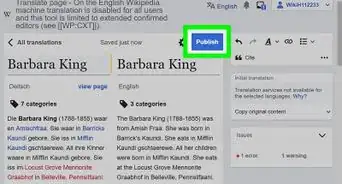wikiHow is a “wiki,” similar to Wikipedia, which means that many of our articles are co-written by multiple authors. To create this article, 48 people, some anonymous, worked to edit and improve it over time.
There are 17 references cited in this article, which can be found at the bottom of the page.
wikiHow marks an article as reader-approved once it receives enough positive feedback. This article received 11 testimonials and 90% of readers who voted found it helpful, earning it our reader-approved status.
This article has been viewed 211,589 times.
Learn more...
Becoming a translator of written texts takes practice, skill, and patience with yourself. It is a fast-growing field that offers many opportunities to learn new things and work with many different types of people. You are the bridge between communication and how people can learn, grow, and talk to one another.
Steps
Starting on the Right Path
-
1Become fluent in another language. “Fluent” is sort of an understatement. You need to know another language inside and out, from formal dialogue to casual conversations, to esoteric terms about a variety of topics.[1]
- It's not a bad idea to study your own language, too. Most people only have an intrinsic understanding of their mother tongue; they can't verbally explain to you how it works. Get an extrinsic knowledge of your language to better understand how it works and how foreigners approach it.
-
2If you’re in college, choose a major that will give you an area of expertise. While you can specifically go to a translation school and get a Bachelor’s of Translation, plenty of people go a completely different route entirely. See yourself translating at a bank? Get a degree in finance. See yourself working at a hospital? Get a biology degree. You need to understand what it is you’ll be translating to be able to do it well – the right knowledge base can do just that.
- Work on your writing skills as well.[2] Many people think that being a translator just means you know two languages. In reality, to be a successful translator, you’ve got to be a good writer, too. In addition to studying your language of choice and your topic of choice, study up on your writing. Just because you can speak the language does not mean you can write it well.
Advertisement -
3Take translation and interpreting classes. Translating is a true skill – a good translator makes tiny modifications to the text they’re working with to make it as good as it can be, taking into consideration audience, culture, and context. If you’re currently a student or even just live near a college, take classes in translation or interpreting. Having this educational background will help sell your skills to future employers.[3]
- While in school, look for opportunities to perform translation or interpreting work on campus for whomever you can. It is crucial to start early so you can get experience and get recommendations for when you need them later on.
-
4If you can, go to that country of your second language. The best way to get an appreciation for a language, a true understanding of it, and to see its nuances and idiosyncrasies is to go to a country where it is an official language. You’ll see how the people actually talk, learn regionalized terms, and get a true feel for how the language naturally works.
- The longer you stay in that country for, the better and better your second language will get. Just make sure you spending your time with locals and not other expats!
Meeting the Qualifications
-
1Take volunteer opportunities. When you’re just starting out, you’ll likely have to do work for free to beef up your resume and make connections. Turn to community organizations, hospitals, and sporting events, like marathons, that have international participants and see if you can just help out on the translating side. It's a necessary part of starting out in this career.
- Odds are you probably know someone who works in an industry that deals with many different types of people with many different linguistic backgrounds. Ask everyone you know if they could use some free help. Why would they turn you down?
-
2Get certified. Though certification isn’t 100% necessary, it will make it much easier to get jobs. Employers look at your background and see this certification and trust you have the skills to do the job. You’ll also be listed on the website of the organization you go through, where potential clients can find you. There are several varieties to consider:[4]
- The American Translator’s Association offers generalized certification programs for translators.[5]
- If you want to be a judicial or medical translator, organizations such as the National Association of Judiciary Interpreters and Translators and the International Medical Interpreters Association offer specialized certifications in this area.[6]
- Check if your state or area has an accreditation programs for translators and interpreters.
-
3Get tested. Take a language proficiency test such as the Defense Language Proficiency Test (DLPT) to show potential clients that you are indeed fluent in your specific language.[7] Similar to an accreditation or certification, showing your test results to prospective employers is a quick way for them to assess your skills and see that you'll be good for the job.
- The American Council on the Teaching of Foreign Languages offers many proficiency tests, too.[8] You can find plenty of tests online offered by other countries, as well.
Finding the Jobs
-
1Sign up for job forums.[9] Websites like Proz and Translators cafe have job postings for freelance work that could be just what you need to jumpstart your career.[10] Some are free and some require a fee – for the record, generally the ones that cost money are a bit more lucrative in the end.
- There are also websites like Verbalizeit and Gengo where you take a test, they assess your skills, and you’re put into a pool of translators that clients come to for work. Once you’re fluent enough and have your resume set, try these sites to supplement your income.
-
2Get an internship. Paid or unpaid internships are very common ways that most interpreters and translators get their experience (no different than many other careers, really). At the end of the internship, you may be taken on as a full-time employee.[11]
- Escort interpreting is an opportunity for inexperienced soon-to-be interpreters to work alongside a more experienced interpreter. Ask any potential employer if they have a shadowing program if you're interested in speaking, not just writing.
-
3Market yourself. Most translators are contractors, not employees usually. You'll work on a project here, a project there, taking work as it comes and goes. Because of that, you need to market yourself everywhere and everywhere. Who knows where the next job could be, even if it's just a few hours?[12]
- Law firms, police stations, hospitals, government agencies, and language agencies are great places to start. Especially if you're just beginning, charge decent rates, or if you have some recommendations under your belt will this be easy.
-
4Have a niche. Concentrate on one niche (maybe two) where you know the language and the topic matter. For example, if you know all the hospital terminology you need to know already, you'll be that much more up to the challenge. You'll also be able to spot content mistakes when they appear, checking for accuracy.
- Translators often have an easier time finding work in industries with a particularly high demand for language services, such as court or medical interpreting. It's wise to have your niche be in one of these areas.
-
5Consider direct mailing. Translation agencies are always looking for good translators. Briefly list your name and contact details, languages and rates and ask for a test translation. As with everything, the longer your letter, the less likely it is that people will read to the end.
Succeeding in This Career
-
1Keep your rates competitive. As you gain more and more experience, you can charge more and more – whether it’s per word, per piece, per hour, etc. Keep your rates competitive and similar to those that match your experience.
- Make sure you’re charging a reasonable price for the times, too. Back in 2008, when the economy wasn’t doing so well, many translators saw a dip in the prices they could charge that people were willing to pay. Make sure your rates match the times, the industry, and your experience.[13]
-
2Get the right software. Computer Aided Translation (CAT) tools are a must for every translator or interpreter – and no, Google Translate doesn’t count. It’s a good idea to install the free Open Source CAT tool OmegaT (along with the free Open Office suite)[14] for any projects you plan on working on.[15]
- Unfortunately, many out sources much prefer to work with the TMs produced by Trados, which is quite expensive. If and when you are able, consider upgrading your software to make work that much easier.
-
3Translate only ‘’to’’ your native language. You’re going to find that translating to your native language is a whole lot easier than translating to your second language. That’s because each work is going to require some topical vocabulary that you likely don’t have in your second language or that you’re going to have to do a bit of research about – which is generally quicker to do in your native tongue.
- You can see here why it's doubly important to know the ins and outs of your own language, too. Successful translating is easiest when you're doing to your native language about a topic you know like the back of your hand.
-
4Stick to what you know. Let's say a company contacts you and wants you to a translate a piece on farming machinery used in the American Midwest in the late 1800s or work on a piece devoted to the freezing of human oocytes. Odds are that work is going to be the one you keep putting off and the one that takes forever to complete because you've got to make sure every word is correct. Instead, stick to your niche. You'll be better at it in addition to feeling better about your work.
- Always try to expand your field of expertise, but don't expand it too far. Do you specialize in medical reports on pregnancy, labor, and delivery? Start learning and working on articles devoted to pediatric care. Slowly widen your expanse of knowledge to accompany more related endeavors. You can then spread out from there.
Community Q&A
-
QuestionWhat languages are in highest demand for a translator?
 Tom De BackerTop AnswererThis depends on where in the world you are. However, don't base your choice of language on what you think the market wants, choose a language you like. If there are already many who chose that language, one more won't make that much of a difference. In addition, if you like the language, it will be much easier to stick with your choice and get really good at it.
Tom De BackerTop AnswererThis depends on where in the world you are. However, don't base your choice of language on what you think the market wants, choose a language you like. If there are already many who chose that language, one more won't make that much of a difference. In addition, if you like the language, it will be much easier to stick with your choice and get really good at it. -
QuestionDoes every college have translating lessons?
 Community AnswerNo. Most colleges will teach languages, but how many and which will depend on where you apply. Research a college before you apply looking specifically for translating lessons.
Community AnswerNo. Most colleges will teach languages, but how many and which will depend on where you apply. Research a college before you apply looking specifically for translating lessons. -
QuestionSo, if I want to become a French translator in the future, what subjects should I study in grade 9 and afterwards?
 Community AnswerThis depends on what your high school offers and what kind of translation you'd like to go into. Any language learning courses (ex. French, Spanish, German) are a huge help, and many universities require a university English Literature credit. Aim for other courses that help you understand culture, motivation, and social habits such as psychology, sociology, anthropology, philosophy, world religions, and global business. Your high school should have a counselor you can go in to and talk to; they'll have a better idea with what courses your school provides and what will be best for you!
Community AnswerThis depends on what your high school offers and what kind of translation you'd like to go into. Any language learning courses (ex. French, Spanish, German) are a huge help, and many universities require a university English Literature credit. Aim for other courses that help you understand culture, motivation, and social habits such as psychology, sociology, anthropology, philosophy, world religions, and global business. Your high school should have a counselor you can go in to and talk to; they'll have a better idea with what courses your school provides and what will be best for you!
Warnings
- The translation field needs fast, reliable people.⧼thumbs_response⧽
References
- ↑ https://www.fluentin3months.com/how-to-become-a-polyglot/
- ↑ https://www.grammarly.com/blog/how-to-improve-writing-skills/
- ↑ https://medium.com/meedan-labs/what-makes-a-good-translator-8ef81ff4a060
- ↑ https://www.iti.org.uk/professional-development/career-development/how-to-become-a-translator
- ↑ http://www.atanet.org/certification/ct_usage_policy.php
- ↑ http://www.imiaweb.org/
- ↑ http://www.dliflc.edu/resources/dlpt-guides/
- ↑ http://www.actfl.org/professional-development/certified-proficiency-testing-program
- ↑ https://www.translatorscafe.com/cafe/searchjobs.asp
- ↑ https://www.proz.com/translation-jobs/
- ↑ https://languagecareers.un.org/dgacm/Langs.nsf/xpFAQ.xsp
- ↑ https://www.altalang.com/beyond-words/5-steps-to-becoming-a-translator/
- ↑ http://www.fluentin3months.com/how-to-become-a-location-independent-freelance-translator/
- ↑ https://omegat.org/
- ↑ http://www.openoffice.org/
- https://www.bls.gov/ooh/media-and-communication/interpreters-and-translators.htm#tab-1
- https://nationalcareers.service.gov.uk/job-profiles/translator
About This Article
To become a translator, start by becoming fluent in another language. Additionally, look into taking advanced language, translation, and interpreting classes since this educational background will help you sell your skills to future employers. Moreover, consider pursuing your certification or taking a language skills test such as The Defense Language Proficiency Test. Then, look for volunteer opportunities in hospitals, at sporting events, or with community organizations to gain experience and get recommendations. To learn how to get a paid internship as a translator, keep reading!





















-Step-9.webp)

























































